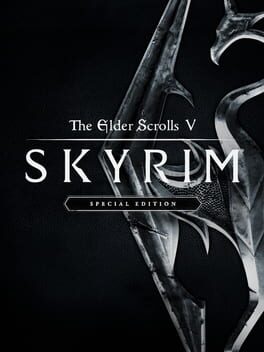xWCJ
Bio
Loving games since the 2000s.
5 - All Timer!
4.5 - Must Plays!
4 - Standouts
3.5 - Above average
3 - Solid
2.5 - Fine
2 - Mediocre at best
1.5 - Poor
1 - Actively hated
.5 - Loathed entirely
Loving games since the 2000s.
5 - All Timer!
4.5 - Must Plays!
4 - Standouts
3.5 - Above average
3 - Solid
2.5 - Fine
2 - Mediocre at best
1.5 - Poor
1 - Actively hated
.5 - Loathed entirely
Badges

Noticed
Gained 3+ followers

Liked
Gained 10+ total review likes
029
Total Games Played
000
Played in 2024
000
Games Backloggd
Recently Reviewed See More
It's not about story, combat, or even exploration. I've been playing Skyrim since its release in 2011. No other game has captured my imagination for as long as this. Of course, modding refreshes the game on a yearly basis, but my first experience with mods was after half a decade of play, and mods have little to do with why I keep returning.
Skyrim is not about the story. Awakening as the Dragonborn and setting out to slay Alduin (eventually, maybe) is perfectly passable, and that sums up all of the quest lines in the game. Passable. There is no interaction between guilds, and choices do not matter. You cruise from quest to quest with next to no repercussions for your decisions (except here and there, and only superficially).
It's not about combat. Swinging a sword around, blasting a draugr with a pillar of fire, stealth archer-ing to victory, is all perfectly passable. Improved with mods, of course, but even then there is next to zero tactical effort. Run in, chug twenty health potions when needed, and swing a greataxe until everything falls.
It's not even really about exploration. At least, not after playing it for over ten years. At first, it was entirely about this, and the only other game that has recaptured the magic of walking all the way from Whiterun to the College of Winterhold as the incredible soundtrack and ambience fills the silence is the first half of Baldur's Gate 3. But over ten years of exploring Skyrim has left little mystery in the game. There is no surprise as a dragon soars overhead, and lands on the ground besides me. I know exactly what to expect.
I could say Skyrim is about atmosphere, but that feels trite at this point. Other games have incredible atmosphere, I'd say even better than Skyrim, and I haven't played them for ten years.
If I were to give my attempt at explaining what Skyrim is about, the best I can do is say Skyrim is simply about playing. 99% of the game is freedom (that 1% really sticks out like a sore thumb, looking at you extended High Hrothgar political dialogue), and that freedom carries over into every aspect. Freedom to use whatever weapon, armor, spell you want. Freedom to head off in any direction at any time without gatekeeping or massive barriers. Freedom to interact with the game world (pick up another useless wooden spoon, or three more carrots). Do you want to chase butterflies, dive into an ancient crypt, or build a house today?
This freedom in Skyrim is what it means to play the game, but it's a focused freedom, and that is incredibly important. The freedom to explore one, particular fantasy world gives it an identity. And its world is full enough to be engaging, and empty enough to let the player's imagination fill it. You're dropped in, but you don't need a PHD in its lore to understand what's going on. It feels like being a child again and imagining vast fantastical expanses with little barrier between you and enjoying that world.
In short, it feels like the mountains. That's why I give it five stars.
Skyrim is not about the story. Awakening as the Dragonborn and setting out to slay Alduin (eventually, maybe) is perfectly passable, and that sums up all of the quest lines in the game. Passable. There is no interaction between guilds, and choices do not matter. You cruise from quest to quest with next to no repercussions for your decisions (except here and there, and only superficially).
It's not about combat. Swinging a sword around, blasting a draugr with a pillar of fire, stealth archer-ing to victory, is all perfectly passable. Improved with mods, of course, but even then there is next to zero tactical effort. Run in, chug twenty health potions when needed, and swing a greataxe until everything falls.
It's not even really about exploration. At least, not after playing it for over ten years. At first, it was entirely about this, and the only other game that has recaptured the magic of walking all the way from Whiterun to the College of Winterhold as the incredible soundtrack and ambience fills the silence is the first half of Baldur's Gate 3. But over ten years of exploring Skyrim has left little mystery in the game. There is no surprise as a dragon soars overhead, and lands on the ground besides me. I know exactly what to expect.
I could say Skyrim is about atmosphere, but that feels trite at this point. Other games have incredible atmosphere, I'd say even better than Skyrim, and I haven't played them for ten years.
If I were to give my attempt at explaining what Skyrim is about, the best I can do is say Skyrim is simply about playing. 99% of the game is freedom (that 1% really sticks out like a sore thumb, looking at you extended High Hrothgar political dialogue), and that freedom carries over into every aspect. Freedom to use whatever weapon, armor, spell you want. Freedom to head off in any direction at any time without gatekeeping or massive barriers. Freedom to interact with the game world (pick up another useless wooden spoon, or three more carrots). Do you want to chase butterflies, dive into an ancient crypt, or build a house today?
This freedom in Skyrim is what it means to play the game, but it's a focused freedom, and that is incredibly important. The freedom to explore one, particular fantasy world gives it an identity. And its world is full enough to be engaging, and empty enough to let the player's imagination fill it. You're dropped in, but you don't need a PHD in its lore to understand what's going on. It feels like being a child again and imagining vast fantastical expanses with little barrier between you and enjoying that world.
In short, it feels like the mountains. That's why I give it five stars.
A solid Jedi experience held back by sticking too close to the 'souls-like' formula.
The best quality of this game became apparent after the release of its sequel, Jedi: Survivor, and is more of a strength of the series than the game. You play as Cal Kestis, a Jedi who has up until this point survived Order 66 and the rise of the Empire. But in Jedi: Fallen Order you remain a Padawan until the end, and it is not until the sequel that Cal becomes a Jedi Knight. It is the unique feeling of playing as a Padawan that sets this apart from other Star Wars games, and marks a sense of progression from game to game in the series.
However, the 'bonefire' layout of levels (called meditation points in this game) and oddly 'heavy feeling' gameplay do less to make the player feel like a Padawan, and more to remind them that this is a souls-like. Usually souls-like combat is a strength, but here it clashes with other aspects of the gameplay.
The best quality of this game became apparent after the release of its sequel, Jedi: Survivor, and is more of a strength of the series than the game. You play as Cal Kestis, a Jedi who has up until this point survived Order 66 and the rise of the Empire. But in Jedi: Fallen Order you remain a Padawan until the end, and it is not until the sequel that Cal becomes a Jedi Knight. It is the unique feeling of playing as a Padawan that sets this apart from other Star Wars games, and marks a sense of progression from game to game in the series.
However, the 'bonefire' layout of levels (called meditation points in this game) and oddly 'heavy feeling' gameplay do less to make the player feel like a Padawan, and more to remind them that this is a souls-like. Usually souls-like combat is a strength, but here it clashes with other aspects of the gameplay.
Drove to a friend's house multiple times over a summer to slay giant werewolves, and watch a victorian city descend into madness.
The game's esoteric narrative is told mostly through the environment, including item descriptions, level layouts, enemy designs, and what could be considered the ramblings of madmen. It is this unique delivery (which itself pairs perfectly with the tone of the game) that elevates what in another developer's hands could have been a simple 'monster hunter' story.
Nearly everything in the game is both game and story. Case in point, the fast and aggressive combat in this game is not only for fun (although it is certainly that too!), but also conveys much about the nature of blood in this universe, and characterizes the protagonist. One of the unique strength of video games is the ability to narrate both through traditional means (music, visuals, text) and gameplay. Bloodborne takes this to a new level.
A masterclass in atmosphere, Old Yharnam will always be one of my favorite locations in gaming, and the soundtrack perfectly evokes the feeling of lovecraft creeping into gothic horror.
The game's esoteric narrative is told mostly through the environment, including item descriptions, level layouts, enemy designs, and what could be considered the ramblings of madmen. It is this unique delivery (which itself pairs perfectly with the tone of the game) that elevates what in another developer's hands could have been a simple 'monster hunter' story.
Nearly everything in the game is both game and story. Case in point, the fast and aggressive combat in this game is not only for fun (although it is certainly that too!), but also conveys much about the nature of blood in this universe, and characterizes the protagonist. One of the unique strength of video games is the ability to narrate both through traditional means (music, visuals, text) and gameplay. Bloodborne takes this to a new level.
A masterclass in atmosphere, Old Yharnam will always be one of my favorite locations in gaming, and the soundtrack perfectly evokes the feeling of lovecraft creeping into gothic horror.


